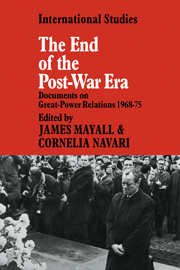Book contents
- Frontmatter
- Contents
- Preface
- Source Abbreviations
- Note on the texts of the documents
- Introduction
- I THE END OF THE COLD WAR
- A Germany
- B Indochina
- C China
- D Korea
- II THE DIPLOMACY OF DETENTE
- III CHANGES IN THE WESTERN ALLIANCE
- IV THE WARSAW TREATY ORGANISATION
- V THE GREAT POWERS AND THE MIDDLE EAST WAR OF OCTOBER 1973
- VI THE CRISIS OF THE INTERNATIONAL ECONOMIC ORDER
B - Indochina
Published online by Cambridge University Press: 07 October 2011
- Frontmatter
- Contents
- Preface
- Source Abbreviations
- Note on the texts of the documents
- Introduction
- I THE END OF THE COLD WAR
- A Germany
- B Indochina
- C China
- D Korea
- II THE DIPLOMACY OF DETENTE
- III CHANGES IN THE WESTERN ALLIANCE
- IV THE WARSAW TREATY ORGANISATION
- V THE GREAT POWERS AND THE MIDDLE EAST WAR OF OCTOBER 1973
- VI THE CRISIS OF THE INTERNATIONAL ECONOMIC ORDER
Summary
Address by President Johnson on American radio and television, 31 March 1968 (extract)
Good evening, my fellow Americans. Tonight I want to speak to you of peace in Vietnam and Southeast Asia.
No other question so preoccupies our people. No other dream so absorbs the 250 million human beings who live in that part of the world. No other goal motivates American policy in Southeast Asia.
For years, representatives of our Government and others have traveled the world seeking to find a basis for peace talks.
Since last September, they have carried the offer that I made public at San Antonio.
That offer was this: that the United States would stop its bombardment of North Vietnam when that would lead promptly to productive discussions – and that we would assume that North Vietnam would not take military advantage of our restraint.
Hanoi denounced this offer, both privately and publicly. Even while the search for peace was going on, North Vietnam rushed their preparations for a savage assault on the people, the Government, and the allies of South Vietnam.
Their attack – during the Tet holidays – failed to achieve its principal objectives.
It did not collapse the elected government of South Vietnam or shatter its army, as the Communists had hoped.
It did not produce a ‘general uprising’ among the people of the cities, as they had predicted.
The Communists were unable to maintain control of any of the more than 30 cities that they attacked. And they took very heavy casualties.
- Type
- Chapter
- Information
- The End of the Post-War EraDocuments on Great-Power Relations 1968-1975, pp. 89 - 110Publisher: Cambridge University PressPrint publication year: 1980



